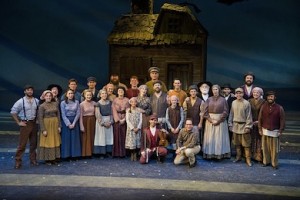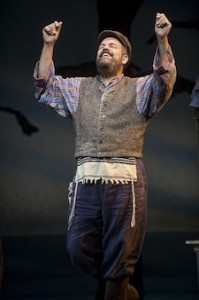Fiddler on the Roof
Barrington Stage Company
Pittsfield, Mass.
Running through 7.14.12
Review by Seth Rogovoy
(PITTSFIELD, Mass.) – If the measure of a good production of Fiddler on the Roof is loyalty to the original, then Barrington Stage Company’s current production of this beloved, iconic, nearly perfect musical, running in Pittsfield through July 14, cannot be faulted. Bolstered by an impeccable, at times stunning collection of voices singing those all-too-familiar melodies; the vibrant, lively Jerome Robbins choreography; and swift staging and technical support that makes this three-hour investment of an evening fly by in the wink of an eye, the whole performance rings true.
But this Fiddler offers something even more. As true and loyal and authentic as it is, director Gary John La Rosa and the cast, especially lead actor Brad Oscar, who is more of a Herschel Bernardi-style Tevye than a Zero Mostel one (and to his credit), uncannily are able to find unexplored, even contemporary nuances in the book, lyrics, and characters, that gives this staging a remarkably fresh quality.
This is no more exercise in nostalgia – although of course it is partly that, and was partly that from the very first time the curtain rose on the musical in 1964 – but a celebration of theater as well as the age-old themes explored in this surprisingly deep and profound work of musical theater.

The cast of 'Fiddler on the Roof' with director:choreographer Gary John La Rosa (Photo by Kevin Sprague)
This Fiddler on the Roof surprised and succeeded on a number of levels. Particularly on the “greatest hit” of the musical, “If I Were a Rich Man,” Oscar succeeded in carving out his own niche in the role. Without veering at all from the text as written, Oscar found a bit more subversiveness in Tevye than we might have expected – more of a willingness to mock and poke fun at rich people; and indeed, this may explain his ultimate sympathy for the young radical, Perchik, whom he welcomes into his house and whom he eventually consents to granting permission to marry one of his daughters, even though this goes against tradition.
Other elements of this production serve to underline the rock-solid foundation of Fiddler on the Roof. Far from watering down the religious and cultural references in the original in order to appeal to a wider audience or make the play more “universal,” the creators of the musical wisely chose to root the drama in the particular, in specifics that even the average person acquainted with Old World life and ritual might not appreciate. It’s that attention to detail that strengthens the core of the play, so when ultimately the hermetic world of Anatevka is fractured, the break itself has all the more greater of an impact.
And far from being a merely Broadway-ized version of Jewish music, there is still a remarkable amount of “authentic’ Jewish and Yiddish melodies and ornamentation – what we now call “klezmer” – in much of the music. In fact, the strongest numbers are those rooted more in the Yiddish theater tradition as opposed to a few blander, mostly forgotten ones. And the small ensemble, under the direction of Darren Cohen, more than ably executes the material, even giving it something of an authentic Old World twist.
To some, Fiddler on the Roof may represent the apex – and the end, to a great extent – of the classic Broadway musical entertainment. But in fact, as made clear by Barrington Stage’s production, Fiddler was a lot more than that – it was a transitional piece of work that, while very much in the Yiddish and Broadway musical theater tradition, paved the way, or anticipated, the revolution that was about to come. Stephen Sondheim in particular is virtually unimaginable without Fiddler on the Roof, as are any other number of modern Broadway composers, including BSC’s own William Finn. Something tells me they both would agree.

